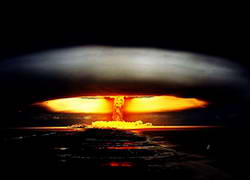|
|
|
Existantial Risks
Other Pages
Risks to Humanity

We debated whether or not to include a "Doomsday" section on the site. We are not alarmist. In the end however, we recognize that to ignore the possibility of humanity's demise is irresponsible for a website dedicate to its future. Education and awareness can be a powerful force when used by citizens to effect change and action in individuals, businesses, and governments. Toward this goal we have established some basic content outlining and assessing some popularized potential threats to our continued well being as a species, with links so that you can research the topic more thoroughly.
:: What is a Doomsday Scenario?
In the context of human evolution, doomsday is any event, condition, or process that results in civilization being unable to progress. In its most extreme form it literally means the extinction of the human race (or derivitives therefrom). There are several schools of thought on the nature of doomsday. In some of these, the phenomenon is projected to be a catastrophic event such as a meteor, nuclear holocaust, etc. In others the 'end' is perceived to be a bit more gradual such as the destruction of our terrestrial ecology. Some theorize that the end to progressive evolution will occur even more slowly in the form of dysgenics, a reversal of the evolutionary process. Finally, there are individuals and organizations who perceive the realization of post-humanity to be the greatest threat of all. Below is a very brief introduction to these ideas with links to facilitate your further investigation.
:: Natural Disaster
"Natural Disasters" cover a lot of territory. Earthquakes, volcanic activity, hurricanes. These are not species threatening though harmful to a subset of humans. Catastrophic for all would be a major meteor or comet impact. Mass extinctions, runaway infernos, erratic climate fluctuations, and devastating affect on human civilization. We place the risk as low because the likelihood of an impact prior to our adequate preparation is low. The privatization of space and the decreasing cost of launch will soon combine to make positive action to such a threat possible. |
:: Ecological Destruction
We categorize the health of our planet at high risk for being able to sustain the current levels of population growth and pollution. While there are a few environmentalists who propose we are in fine shape, the risk that we are not is too great to ignore the issue. We view overpopulation as a major, but not the only, contributor to poor ecological health. We are not tree-huggers, but advocate learning to live in balance with our environment before we spread "locust" behavior to other worlds. |
:: "Terrorist" Threats
Terrorists cause and intend to cause death, social disruption, and emotional pain to humanity. Whether it be rogue nations or a band of outlaws, their destructive powers are only limited by the weapons at their disposal. As technology makes greater destructive power easier to acquire, it may inevitably fall into hands bent on the destruction of civilization. Conventional weapons (including aircraft) and chemical compounds only cause local damage. Likely methods of mass destruction on a societal scale are biological agents and nuclear bombs. Nuclear detonations would only cause the destruction of civilization if accomplished in sufficient number. A well engineered and strategically released virus could spread like wildfire throughout the world. We rate this risk as high because the technology exists or soon will, and there are people who want
to use it.
|
:: Dysgenics
Dysgenics refers to the process of individuals with 'poor' intelligence or characteristics producing disproportionately more progeny due to societal nullification of the natural selection process. The theoretical result is a steady genetic deterioration in human populations. One theory states that we will de-evolve genetically (loss of intelligence and the ability to utilize technology) to maintain equilibrium with the environment. This, of course, is very unlikely if for no other reason because of the time scale required. Before this ever becomes a species threatening issue we will either have allowed the destruction of civilization via some other method or have long since transcended the genetic bonds of biological recombination. |
:: Anti-Technology Political Activism
|
:: Post Humanity as the Ultimate Threat
What is this risk? This risk is that through changes in our physical being we change our spiritual nature, or our very "human-ness". There are those that claim altering anything about ourselves places us in jeopardy of becoming posthuman, or worded more strongly, non-human.
We are in the process of identifying Internet and other resources who
present the case clearly. |
|
|
|


